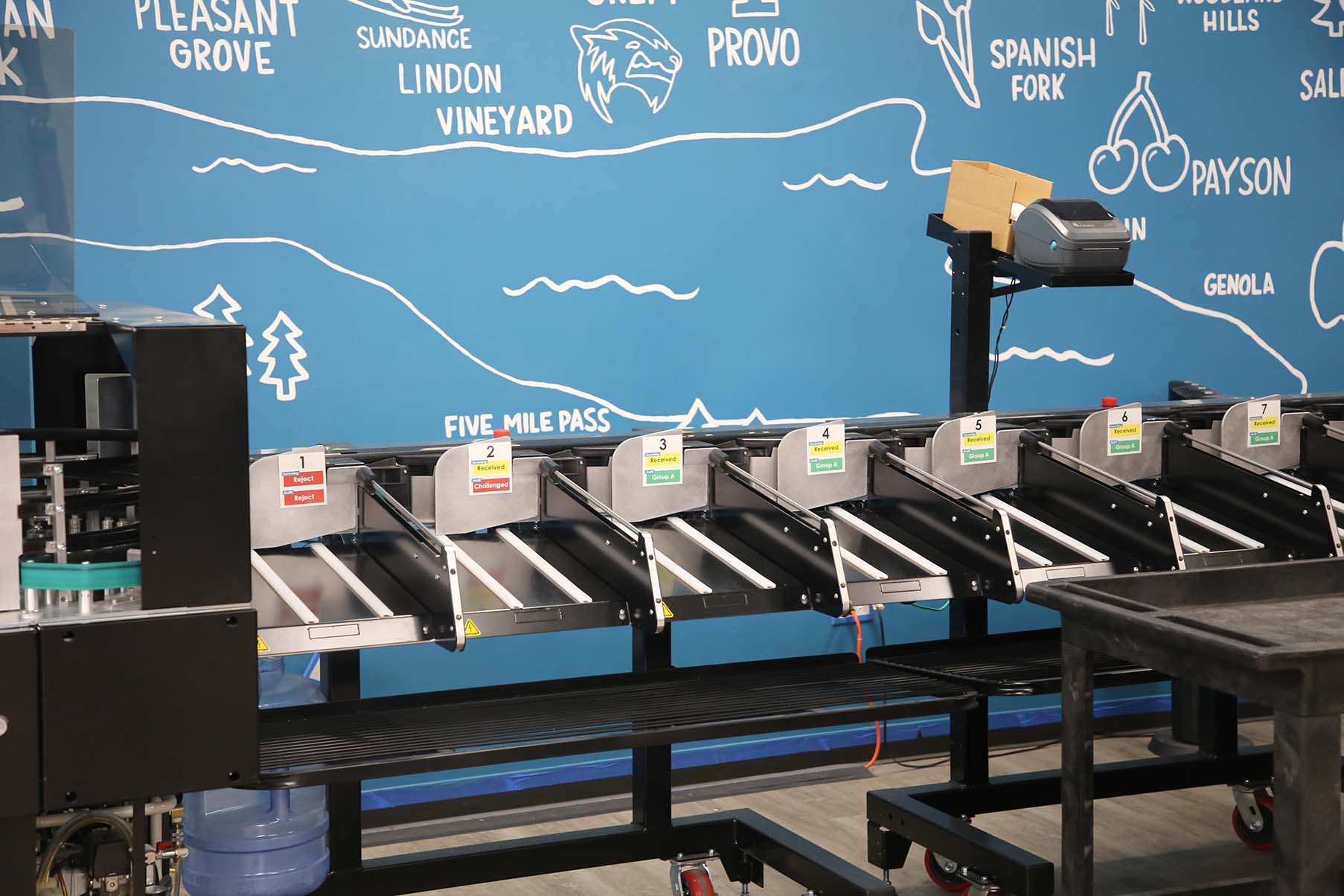
Utah politicians are encouraging young voters to avoid party fealty and “vote with their values” during the Nov. 8 midterm elections, regardless of their political identity or party affiliation.
BYU students are as politically diverse as the rest of the American population, despite Utah’s typically conservative political inclinations. Research by the Center for the Study of Partisanship and Ideology ranked BYU the 26th most politically diverse university out of 150 top research institutions in the U.S. Forty-eight percent of students identified as conservative, 32% identified as liberal and 20% identified as moderate, making BYU the most politically diverse university in Utah.
A flawed democracy
The United States’ pluralistic political system is a crucial component of the democratic makeup of society. Citizens elect leaders to make decisions for them, and a country is affected by those decisions.
However, the Economist Intelligence Group has analyzed every country on an established Democracy Index since 2006, and in 2021, the U.S. fell short on some of the 60 key indicators, deeming the country a “flawed democracy,” as defined by the study. The U.S. has not met the guidelines of a “full democracy” since 2016, at the time Donald Trump began his term as president.
Twenty-one countries were deemed a “full democracy,” with Norway ranking the highest with a score of 9.75 out of 10. In comparison, the U.S. only scored a 7.85, falling short of an 8.01 score that would deem the country a “full democracy.”
As U.S. citizens vote for candidates during the 2022 midterm elections, each vote they place could be the turning point in helping the U.S. return to “full democracy” status, amongst other predominantly English-speaking countries such as New Zealand (9.37), Australia (8.9) and Canada (8.87).
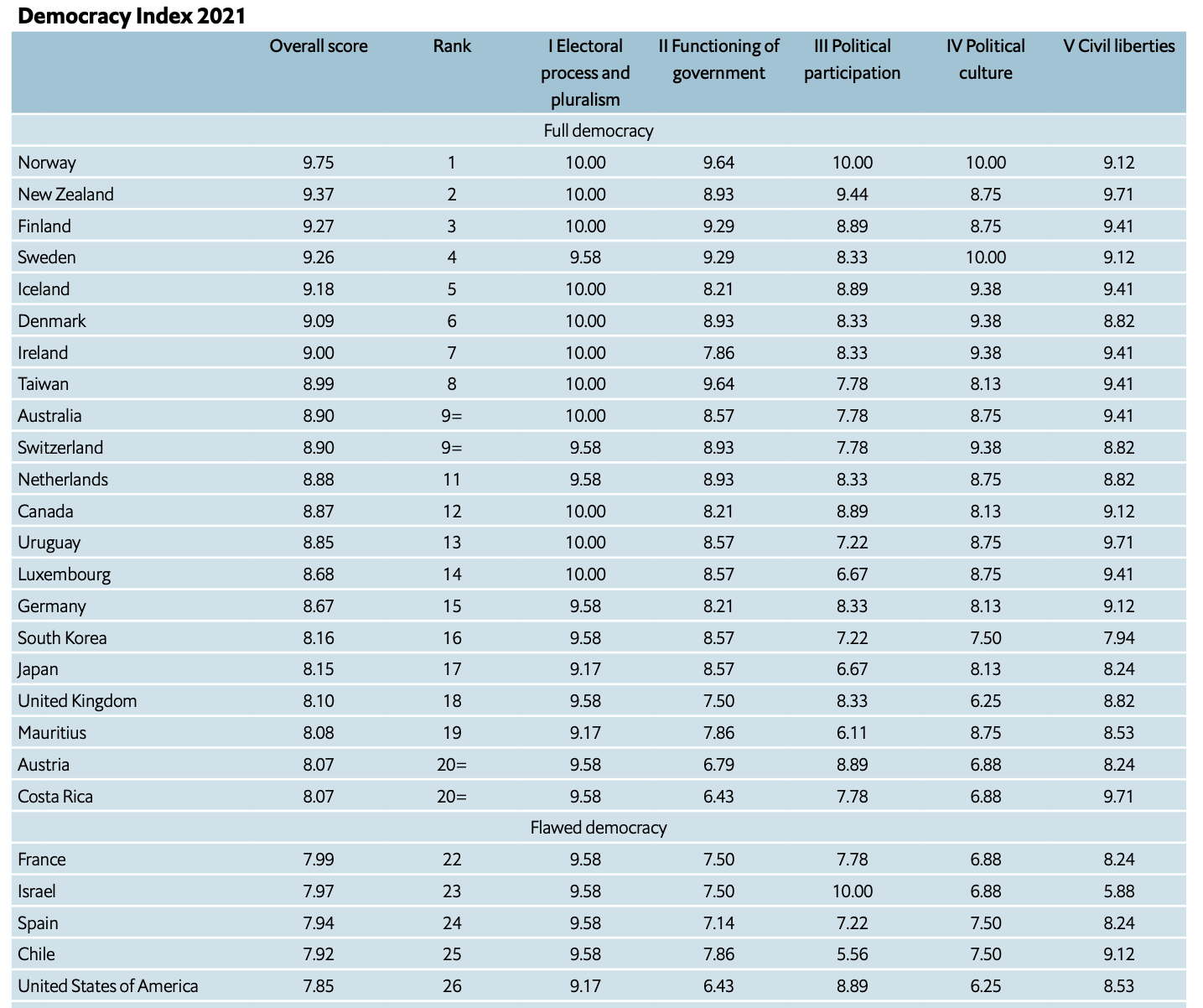
Candidate over party
Midterm elections welcome a unique set of questions to voters without party affiliation and those with a mixture of political ideologies. Even for those with solidified party identities, one universal question remains the same: “Who do I vote for, and why?”
Ben McAdams, a former member of the U.S. House of Representatives from Utah’s 4th district, shared his advice — and personal philosophy — regarding candidate selection when voting, particularly in today’s political climate.
“It’s always important for people to look at the person and what they stand for and their position on the issues before you look at a political party,” he said.
McAdams, a Democrat himself, currently supports Evan McMullin, an independent candidate in Utah running for U.S. Senate against Republican incumbent, Mike Lee. As such, McAdams currently applies his own advice of supporting candidates based on what they support, not their party identity.
McAdams says he knows firsthand the importance of voting based on a candidate’s values as opposed to party fealty from witnessing how “broken” Washington D.C. is. He explained his reason for supporting McMullin despite their differing political affiliations.
“He’s running not as a Republican or a Democrat, but as an independent who’s going to be free to do what’s right for Utah and for the country without being beholden to party bosses or special interests,” he said. “There’s a lot I agree with, with Evan, but most of all it’s his integrity, even if not everybody agrees with him.”
Today Utah Democrats voted to join Evan McMullin’s independent coalition and NOT nominate a candidate for U.S. Senate. I’m proud to be part of this coalition. Together we can win this race and defeat Mike Lee. #utpol pic.twitter.com/NuI84mRqSa
— Ben McAdams (@BenMcAdams) April 23, 2022
Political Divisions and Unifications
Within today’s sensitive political culture, disagreements between parties and ideological disparities often fuel political division. According to the Economic Intelligence Unit, political sectarianism was the main downfall of the U.S. in the 2021 democracy overview, with political culture ranking the lowest out of all the United States’ scores. The EIU says this political divide compromises the function of government and cripples the legislative process.
Ethan Busby, a political psychologist and professor specializing in political extremism, shared his expertise on overcoming this divide, and normalizing political differences.
“Caring for each other and trying to work for what’s best as a group doesn’t require us to say we agree about everything,” Busby said. “Accepting that and being okay with that ambiguity I think is important, especially in politics.”
McAdams utilized this concept as a Democratic leader in Utah amongst a typically right-leaning population.
“In order to succeed as a Democrat in Utah, I had to be good at listening to people who had different opinions and be willing to work collaboratively to find solutions that could get a broad consensus,” he said. “By listening, we can make a good idea better.”
According to Busby, building tolerance is not about agreeing with one another, but more so about understanding different experiences and views. Brycen Walker, a conservative BYU student, is one person who has taken this approach to tolerance and seen changes in his own political standings as a result.
“There’s some things where I’ve heard other people’s experiences and I’ve actually changed my mind on certain things,” Walker said, elaborating that open dialogue has strengthened some of his long-standing political beliefs. “I’ll always engage in open and honest dialogue with people who think differently than me, which I think is very beneficial. It’s helped me to refine a lot of my views.”
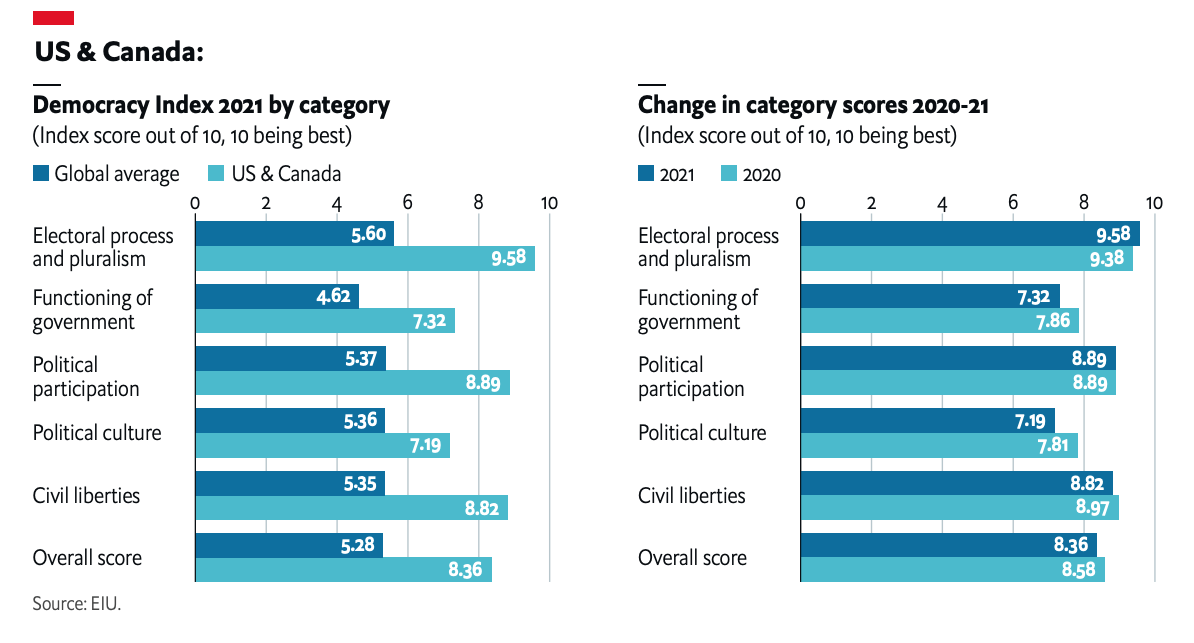
The internet: fueling and extinguishing political flames
While Busby and Walker say open political dialogue is key to fostering harmonious relationships and developing political identity, hostile online environments — particularly social media outlets — can hinder the progress of political harmonization.
As the internet welcomed the social media barrage of the 2010s, voters gained access to a neverending slew of political dialogue, which has become both a positive and negative addition to American politics — Donald Trump’s ban from Twitter, internet trolls, Instagram content warnings, anti-Biden Russian interference with the 2020 election and more.
Busby discussed the powerful role social media can play in influencing individual political ideologies.
“I think that social media is perilous in the sense that it can give us a distorted sense of what other people think and believe, because not everybody is talking about politics on social media,” he said. “The people that you and I see talking about politics on social media aren’t the same. It can give us, again, a distorted picture of what our opponents are like or what our own team is like.”
Busby said social media can also be promising, as it can be used as a tool to understand people’s perspectives that would otherwise not be accessible.
“It can help us develop a wider range of ideas,” he said. “I think we could use these tools to understand people better. Now we don’t, often. Some of that is our fault, some of that’s the fault of how the algorithms are for these companies, but we could.”
Utah County Clerk Josh Daniels advised young voters at Provo’s ballot processing center open house to be vigilant in deciding what media they consume during elections.
“In 2020, early on in the year, there were a lot of people spreading misinformation, disinformation or malinformation — they’re different things. There’s a lot of that going on. Some of it’s just innocent mistakes or rumors,” he said. “In 2020, election administrators all across the country came together in a unified strategy to give accurate information. They actually came up with a hashtag: #trustedinfo.”
When asked where voters should go to get trusted information, Daniels advised the following:
“I would say go to official sources — county clerk, your local election administrator in your county or your state. They’re gonna have good information. The other thing would be reputable — key word ‘reputable’ — national media sources,” he said.
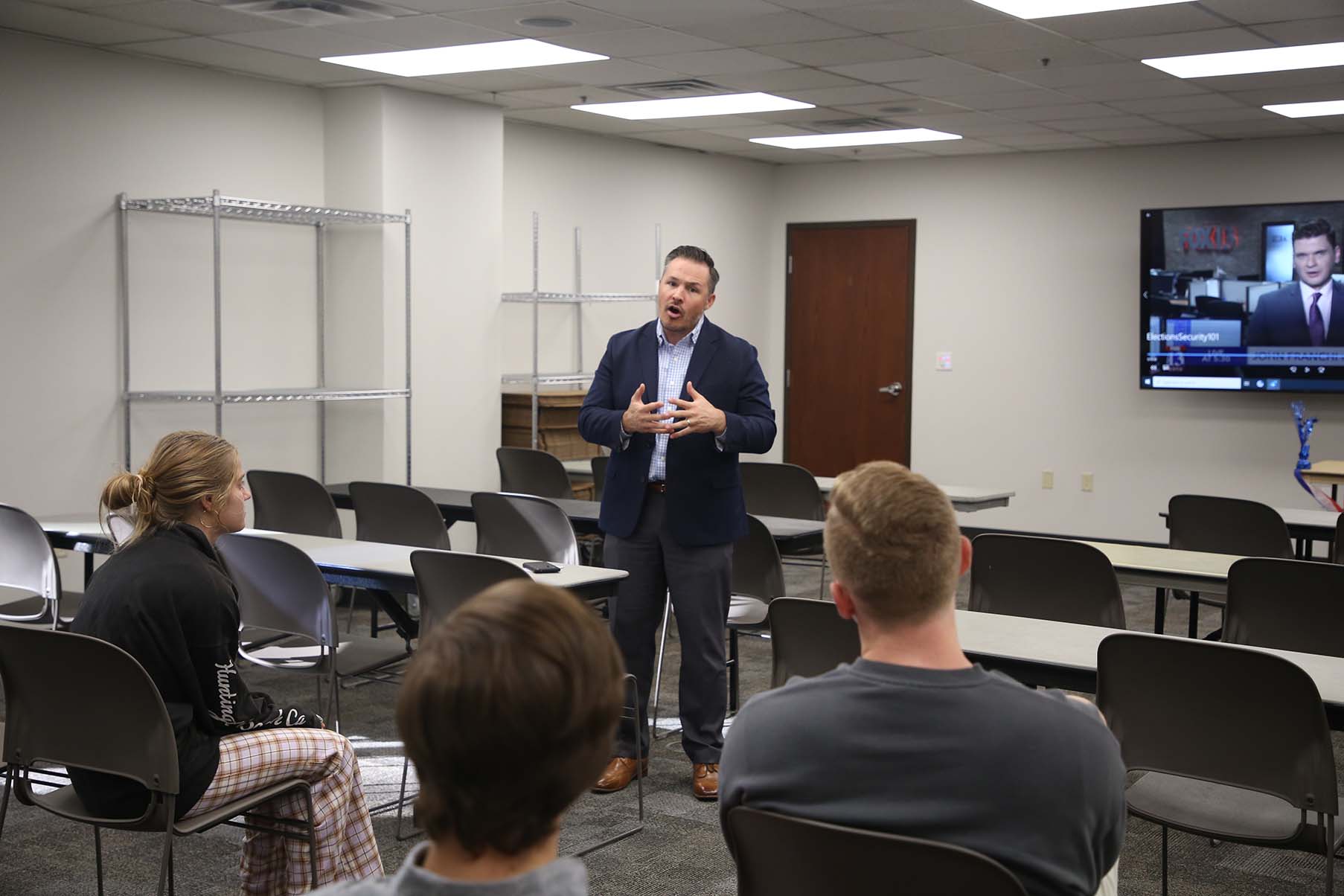
A solid vote from a moderate stance
Young voters, who stereotypically use social media more than older voters, are critical contributors to overcoming political divides. However, for many students who hold moderate political beliefs, it can often be hard to identify with a particular party and to know who to vote for.
BYU student, Isaac Lamoreaux, who grew up in a conservative household but no longer considers themself a Republican — and now usually votes Democratic — says his political beliefs “change pretty frequently.”
“Sometimes being a moderate can be seen as wishy washy, especially if your stances change on specific aspects,” he said. “On issues that are super important that involve the rights of other people, I would say that’s not the time for being a political moderate. If the other side is an extreme group, then it’s not the time to sit down at the table and cooperate.”
Other college students like Lamoreaux who are actively involved in politics, shared their advice to voters who may be on the fence during this year’s midterm elections.
Emma Fetzer, president of The Young Democrats of Utah, said a values-based approach to voting is important.
“Vote with your values. Ignore what each party says, ignore what each candidate says, and instead look at values,” she said. “Make sure the things you care about are the things the candidates care about. If one candidate cares about that, vote for that candidate. It doesn’t matter what party, it matters what they believe.”
Taylor Bentley, a conservative libertarian BYU student, advised fellow students to not “be afraid to vote for an independent if you’re a Republican.” Bentley’s remarks were rooted in his belief that individuals should be willing to stand up for their own beliefs, regardless of party affiliation, citing Mitt Romney’s vote to impeach Trump as an example.
“If we have more politicians who are willing to work with the other side and listen to the other side, we’ll be in a better place politically,” Bentley said, echoing former senator McAdams’ sentiments.
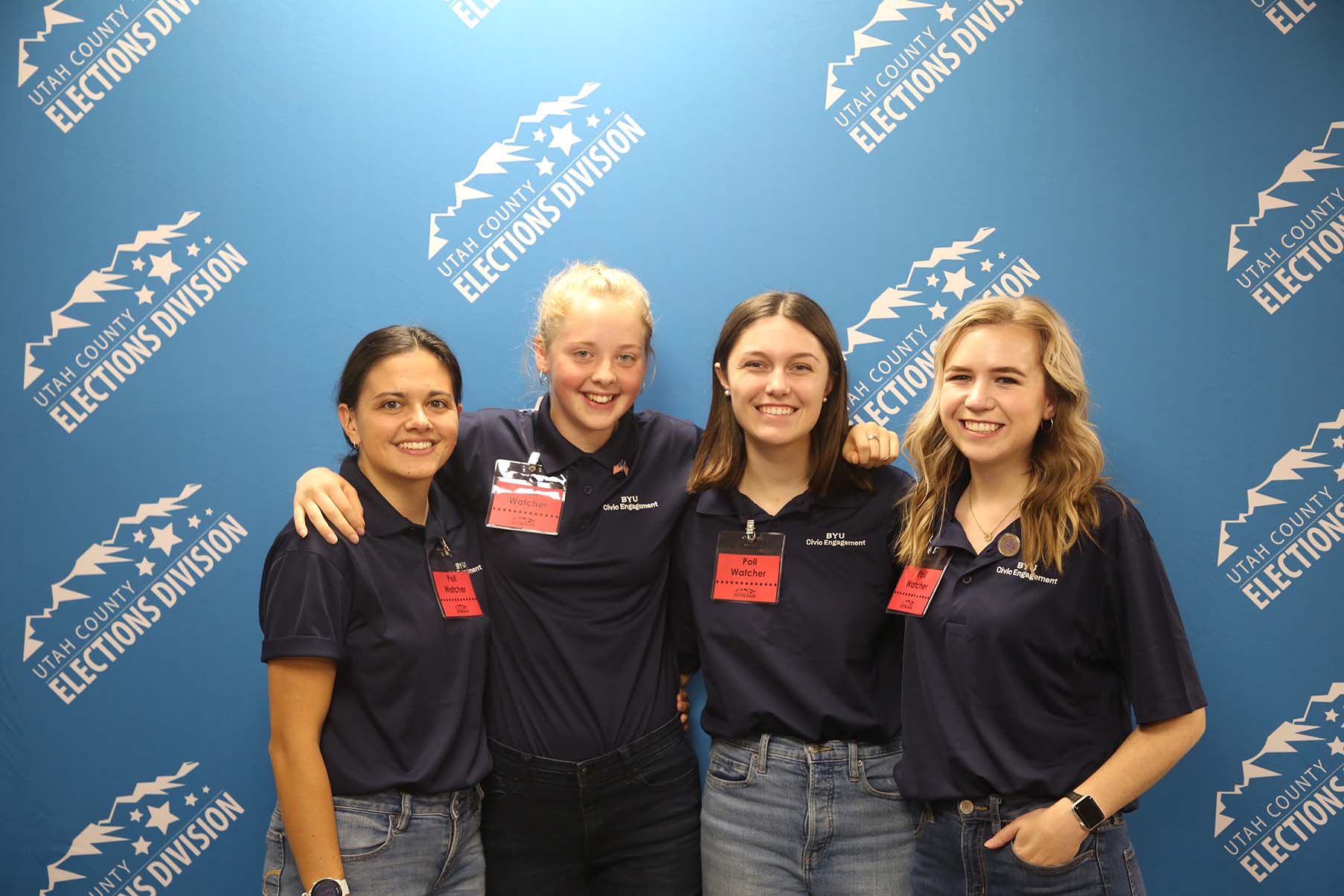
Every vote counts to heal U.S. democracy
“It’s going to take a collaborative spirit not partisan finger pointing,” McAdams said, when asked what needs to be done to change the American political culture. “It’s time to elect people who can break out of that partisan dichotomy, and are willing to act independently to do what’s right to heal our country.”
With only one week until the Nov. 8 midterm election day, voters are encouraged to consider their own values in electing leaders, to contribute to the United States’ ascension to “full democracy” status once again.
“Voting matters,” McAdams said.
Voters are encouraged to reach out to local leaders and visit candidate websites for verified and trusted information during the 2022 midterm election season.




